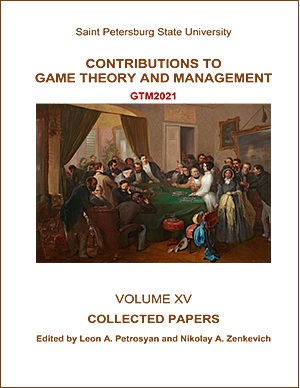Comparing the Manipulability of Approval Voting and Borda
DOI:
https://doi.org/10.21638/11701/spbu31.2022.18Abstract
Keywords:
social choice, strategic voting, Borda, scoring rules
Downloads
Download data is not yet available.
References
Aleskerov, F. and Kurbanov, E. (1999). Degree of manipulability of social choice procedures. In: Alkan A., Aliprantis, C. D. and Yannelis, N. C. (eds.). Current trends in economics, vol. 8, pp. 595–609. Springer: Berlin, Heidelberg
Arribillaga, R. P. and Mass, J. (2016). Comparing generalized median voter schemes according to their manipulability. Theoretical Economics, 11(2), 547–586
Arribillaga, R. P. and Mass, J. (2017). Comparing Voting by Committees According to Their Manipulability. American Economic Journal: Microeconomics, 9(4), 74–107
Barber, S., Sonnenschein, H. and Zhou, L. (1991). Voting by Committees. Econometrica, 59(3), 595–609
Bartholdi, J. J, Tovey, C. A. and Trick, M. A. (1989). The computational difficulty of manipulating an election. Social choice and Welfare, 6(3), 227–241
Bonkoungou, S. and Nesterov, A. (2021). Comparing school choice and college admissions mechanisms by their strategic accessibility. Theoretical Economics, 16(3), 881–909
Conitzer, V., Sandholm, T. and Lang, J. (2007). When are elections with few candidates hard to manipulate? Journal of the ACM, 54(3), 14-es
Decerf, B. and Van der Linden, M. (2021). Manipulability in school choice. Journal of Economic Theory, 197
Dummett, M. and Farquharson, R. (1961). Stability in Voting. Econometrica, 29(1), 33–43
Elkind, E., Lackner, M. and Peters, D. (2017). Structured Preferences. In: Endriss, U. (ed.). Trends in Computational Social Choice, pp. 187–207
Faliszewski, P., Hemaspaandra, E., Hemaspaandra, L. A. and Rothe, J. (2011). The shield that never was: Societies with single-peaked preferences are more open to manipulation and control. Information and Computation, 209(2), 89–107
Gibbard, A. (1973). Manipulation of Voting Schemes: A General Result. Econometrica, 41(4), 587–601
Kelly, J. S. (1993). Almost all social choice rules are highly manipulable, but a few aren't. Social choice and Welfare, 10(2), 161–175
Moulin, H. (1980). On Strategy-Proofness and Single Peakedness. Public Choice, 35(4), 437–455
Nitzan, S. (1985). The vulnerability of point-voting schemes to preference variation and strategic manipulation. Public Choice, 47(2), 349–370
Pathak, P. A. and Snmez, T. (2013). School admissions reform in Chicago and England: Comparing mechanisms by their vulnerability to manipulation. American Economic Review, 103(1), 80–106
Satterthwaite, M. A. (1975). Strategy-proofness and Arrow's conditions: Existence and correspondence theorems for voting procedures and social welfare functions. Journal of Economic Theory, 10(2), 187–217
Walsh, T. (2011). Is computational complexity a barrier to manipulation? Annals of Mathematics and Artificial Intelligence, 62(1–2), 7–26
Downloads
Published
2023-01-27
How to Cite
Teplova , D., & Ianovski , E. (2023). Comparing the Manipulability of Approval Voting and Borda. Contributions to Game Theory and Management, 15, 236–249. https://doi.org/10.21638/11701/spbu31.2022.18
Issue
Section
Articles
License
Articles of "Contributions to Game Theory and Management" are open access distributed under the terms of the License Agreement with Saint Petersburg State University, which permits to the authors unrestricted distribution and self-archiving free of charge.




